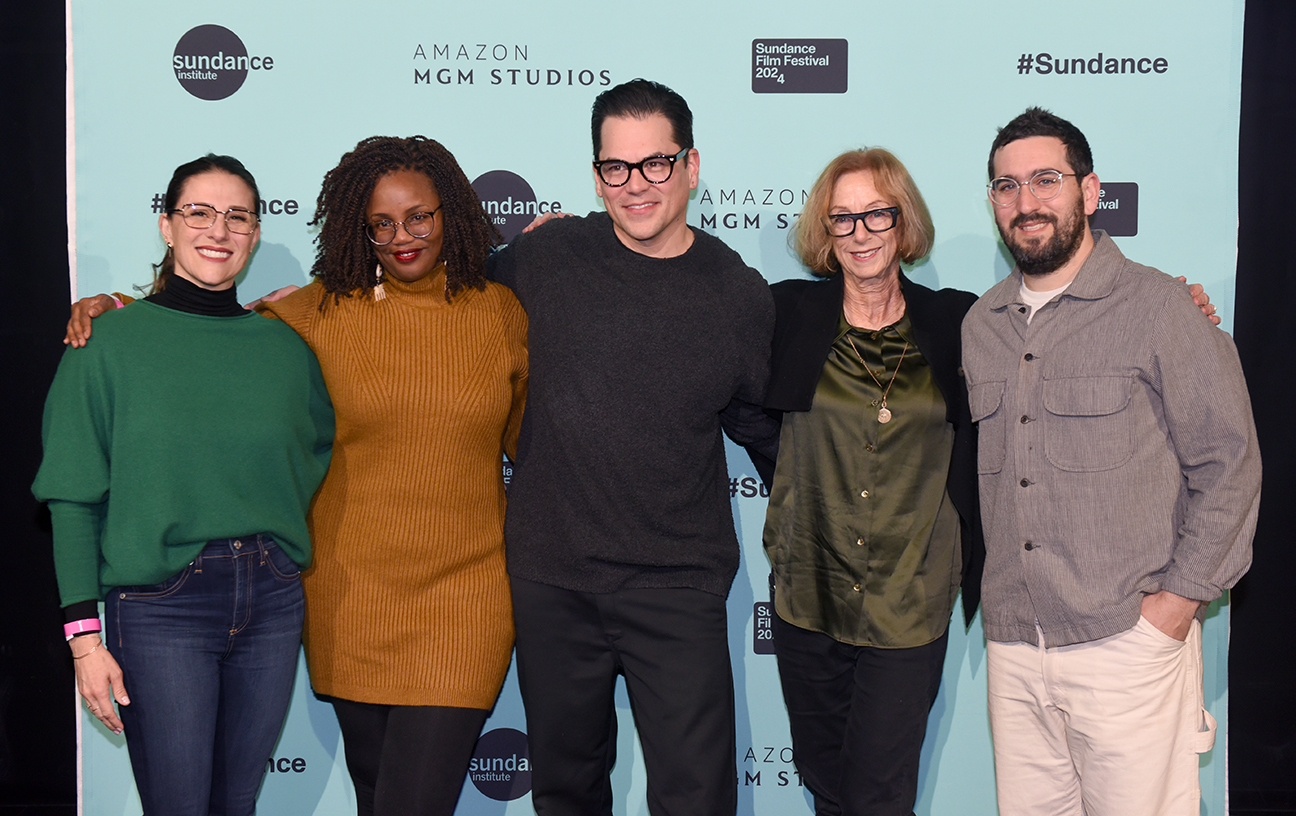
Amazon MGM Studios’ Brianna Oh, producer Toni Kamau, producer Jonathan Wang, Sundance Institute’s Michelle Satter and producer Becker-Patton at the Sundance Institute Producers Awards on Jan. 21, 2024.
aley Nord Shutterstock/Courtesy of Sundance

One of the biggest challenges of the Sundance Film Festival is trying to fit it all in and be everywhere all at once in Park City. On Sunday morning at The Park, a group of festival insiders stayed in one place for about two hours to take in a keynote from Everything Everywhere All at Once‘s Oscar-winning producer Jonathan Wang and witness two producers being singled out with awards and $10,000 grants.
It all went down as part of a producers award collaboration between the Sundance Institute and Amazon MGM Studios. The prizes — one for fiction, one for nonfiction — were awarded to producers Brad Becker-Parton of Stress Positions and Toni Kamau of The Battle for Laikipia, two films that premiered in this year’s lineup.
Becker-Parton’s other credits include Tina Satter’s Reality, starring Sydney Sweeney, and Mariama Diallo’s Master, starring Regina Hall, a Sundance selection released by Amazon MGM Studios in 2022. Kamau is a PGA and Peabody-nominated producer, filmmaker and founder of the Kenyan-based production company We Are Not the Machine.

Amazon MGM Studios’ Brianna Oh, producer Toni Kamau, producer Jonathan Wang, Sundance Institute’s Michelle Satter and producer Becker-Patton at the Sundance Institute Producers Awards on Jan. 21, 2024.
aley Nord Shutterstock/Courtesy of Sundance
Other speakers at the event included Sundance Institute CEO Joana Vicente and Amazon MGM Studios head of documentary features Brianna Oh. For his part, Wang took a walk down memory lane to retrace a Sundance history that includes Swiss Army Man, the 2016 entry directed by his longtime collaborators the Daniels, aka Daniel Kwan and Daniel Scheinert. His ties go back a bit further.
“In 2015, I attended Sundance for the first time with an interactive short film called Possibilia. It was made by some unknown music-video nerds working under the pretentious pseudonym Daniels,” he noted. “All of three people watched the film: Two were Daniel Scheinert’s parents, and the third was probably a glitch in the tech.”
He also recalled attending the same producers celebration in 2015, when he witnessed indie multihyphenates Mark and Jay Duplass do the same thing he was charged with this year. “I watched filmmakers support each other and welcome each other for the very fact that they shared in the struggle of telling stories. That was powerful to witness,” said Wang. “It then compounded when Mark and Jay Duplass took the stage to give the very keynote that Sundance foolishly believes I am worthy of giving right now. But Mark and Jay spoke proudly about working with micro budgets, building loyal crews, sharing points generously, having a ‘no assholes policy’, and I was really moved. Those values were how I tried to approach producing my projects.”
Now that he’s got Oscar-winning cred, Wang’s comments about the responsibility producers shoulder carry additional weight. “Our work is hard, our days are long, and many of us have experienced things on sets and in offices that are flatly traumatic,” noted Wang, whose other credits include The Death of Dick Long, False Positive and the upcoming The Legend of Ochi. “I want to acknowledge that we work in a hyper-competitive, highly public and notoriously toxic trade and that we as the producers — and I will also add directors — must recognize the way people are entering into our spaces, our sets and our projects.”
He closed with a challenge with those present as they hit the town to be more places all at once. “As we leave today to watch films, go about our meetings and enjoy this wonderful festival, I challenge us to pause and take inventory of the story we embody. I challenge us to be present with those we are here with and to make space for them to be seen. And I challenge us to take this spirit of care, and to infuse it into our lives, our sets, our stories and our planet.”